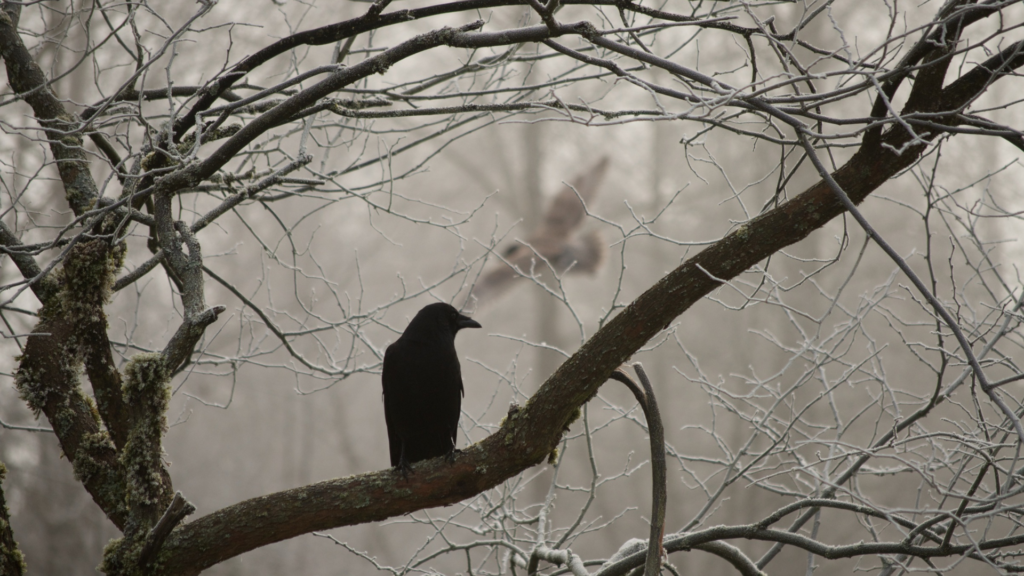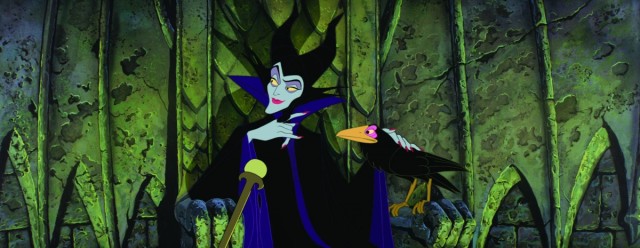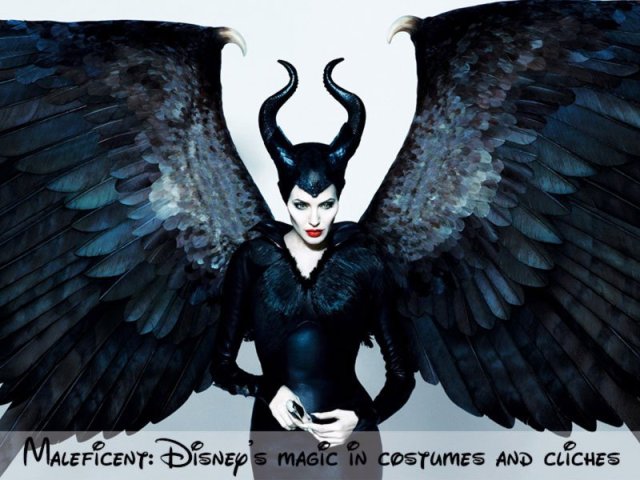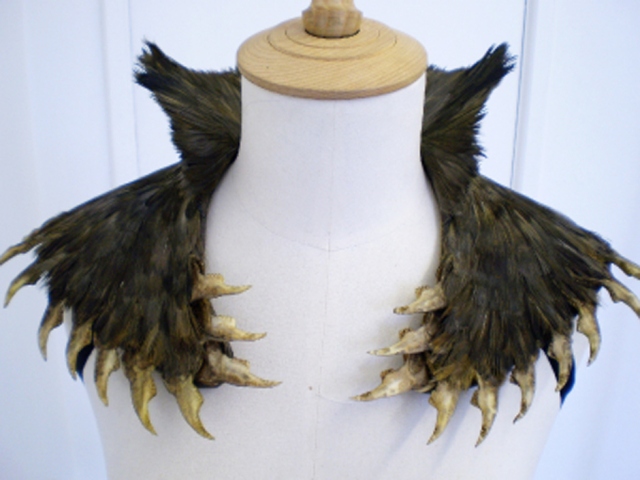
Especially in the USA, Crows or Blackbirds are simply part of the landscape, and over time, they have become associated with the autumnal time of year. I suppose that is because we associate scarecrows with the fall, and what is a scarecrow’s job? To scare crows.
Perhaps it is because they are black that crows have become associated with scariness.
In 1845, Edgar Allan Poe wrote The Raven. The poem begins. “Once upon a midnight dreary,” and Poe continues to describe the raven or the crow as a type of devil who had the fiery eyes of Hell.

Walt Disney used a similar type of sinister blackbird in his movie Snow White, which was released in 1959.


In Disney’s 2014 Maleficent, Diaval, is turned into a Raven.
I don’t think that anyone would believe that Diaval is a foreboding character, but in that Maleficent’s wings are raven-like, there still is a suggestion of crow-like creepiness in the 2014 film.

Through her costumes, Maleficent still conveys the idea that something crow-like or raven-like is hovering around–disquieting things. Hence, Maleficent’s costumes become a major character in the 2014 film. Because the costumes suggest something of the 1959 raven. memories of that 1959 raven are also in the 2014 film. Notice the crow-like collar on the costume above. Also, note the claws that Maleficent wears around her neck.
This is an excellent example of how very important costuming is. In films, costuming is a major tool for the creation of characters.
The Raven
SOME CROWS I HAVE KNOWN
by
Winthrop Pacard
ALREADY the robins that piped such a deafening morning chorus all about us last June are swirling in great flocks about the Florida everglades, getting up a Christmas spirit by filling their crops with holly berries and practicing spring songs, and perhaps a little spring love-making in the waxy shadows of the mistletoe bough.
But not all of them. Yesterday, at sunset, I heard one that had not joined the innumerable throng. Instead, he lingers to take his Christmas dinner in New England, his holly the red-berried alder, his mistletoe black instead of white, with the crowded fruit of the buckthorn. Like his mates, a thousand miles away, he,{196} too, sang a faint little winter song that was like an echo of his summer jubilate, a triumphant, light-hearted tune indeed, but not heartily sung. Twilight gloomed the deep pine growth where we were, and though the fires of a November sunset burned red and angry in the sky, they warmed the grove only to the eye, while the keen north wind that had blowzed the sky with clouds all day seemed to be seeking shelter there with us. He, too, whistled in such keen sibillation that the faint oak-leaf rustle from the hillside sounded like chattering teeth.
The robin’s faint song may have been one of contentment with his lot, or one of evening praise for as many mercies as he had received, but it sounded far more, in that light and that biting air, like the boy who whistles at night on the long and lonesome road to keep his cour{197}age up. Then the song died away in his throat, for across the angry crimson of the west flitted silhouetted black wings, and a pair of crows lighted among the thick boughs of the higher pines to roost for the night.
The robin muttered “tut, tut!” somewhat hysterically and slipped away to safer shelter deep among the low boughs and denser shadow of a tree on the edge of the open pasture. No doubt he recognized hereditary enemies of his race, and though he was tough enough to dare a northern winter, was unwilling to take chances with the strong black bills of these reckless freebooters of the wilderness. And he was right. Crows rarely eat grown robins, for they cannot catch them, but the tender, half-fledged nestlings are the mainstay of many a crow saturnalia.{198}
Only too well do I remember an orgy of this sort. It was late May and the scent of the apple blossoms filled all the orchard with delight, just as the robins, morning and evening, filled it with song. They sang for every cloud that crossed the sky and piped up now and then in the full sunshine. How they found time for it all it is hard to tell, for every nest was full of young birds that eat almost their weight in hearty food each day.
One day the tunes changed. Coming into the farthest corner from a woodland trip I heard from some ancient, neglected trees, such as the robins always love and in which were grouped three or four nests, wild shrieks of anger and dismay from a whole chorus of robins. Coming nearer I could hear crow voices in guttural undertones, croaking ghoulishly.
The crow has a language, not exactly of words but of inflections and intonations, which express the primal emotions pretty clearly. I always think I know what he means, though undoubtedly his crow hearers understand the finer shades of inflection better than I do.
There is the shout of warning which says plainly, “Look out, there is trouble right ahead of you!” A similar shout, but with different inflection, says, “Come on. Come on. I’ll show you something worth seeing.” There is the yell of derision and defiance with which a flock drives an owl through the forest; there is the gentle cooing croak with which mated birds do their love-making. There is the cry of terror and the suppliant call for food from the full-grown young. There is also a peculiarly devilish croak of satisfaction which they make only{200} when feasting on the tender nestlings of pasture birds.
This I knew, and I rushed to the rescue of my young robins, but I was much too late. The feast was well along toward its conclusion and the nests were nearly empty. The parent birds, reënforced by others of the neighborhood, were doing their best. They plunged and darted at the marauders, plucked and clawed at them, but not one whit could they stir them, nor did they leave at my approach, and it took vigorous and well-directed volleys of stones from a near-by heap to drive them away. Then they went heavily, as if gorged to such repletion that they could hardly fly.
I went on home sick at heart, and vowing shot-gun vengeance on all crows thereafter; and it was not until I had carved the chicken for dinner that I{201} realized that there might be extenuating circumstances. For, after all, the crows had as much right to robin for their dinner as I had to chicken for mine.
Crows certainly are responsible for a large amount of infant mortality among young birds in the nesting season, however, and to my mind it is the greatest crime of which these black robbers stand guilty. It is for this reason that the crow is so well hated by smaller birds, and I don’t doubt it is this consciousness of guilt that makes him hang his head and flee away before the attack of the least of them. Blackbird and kingbird alike will send him flapping in shamed haste for the big wood, and it makes no difference whether or not he has attempted to burglarize their homes or slaughter their children.
Just as a known pickpocket is rail{202}roaded out of town by the police, whether guilty of present misdemeanor or not, so the kingbird sends flying any crow that crosses his path during the nesting season. You will hear the strident, half-hissing scream of rage on the part of the kingbird, see him launch himself from the air above and strike the back of the flapping crow with a thump that perhaps makes the feathers fly. The crow never attempts to strike back. He merely hangs his head and scuttles the faster for the tall timber where is release from this torment. I’ve never known the kingbird or any other indignant small bird to do the crow material harm; but he certainly sends him flying.
One August, traversing a lonely swamp, I heard a great commotion among crows over in its duskiest, farthest corner. Slipping quietly up, I found a number of them{203} swooping about another, which sat on a low limb within a few feet of the ground. This crow was making beseeching cries, like those of a greedy youngster which still hoped to be fed, and I thought this was the case at first, for, though by August all young crows have long been full grown, the old birds continue to keep oversight of them. I had no sooner come within sight than the keen birds saw me, and away they all went except the supposed youngster, who still kept his perch and his silence, nor did he attempt to move as I approached and finally picked him off his perch.
For he was no youngster, this crow, but was blind, old, and emaciated. I think from the appearance of his eyes that he had been blind for a considerable time, and the interesting question arises as to how he had lived thus far. Surely{204} he could not have found food for himself thus for any long period of time, so perhaps the other crows had fed him right along.
How old crows grow to be I do not know, but whatever extreme age they attain this one was it. I took him home and gave him the freedom of the yard, which he accepted. I fed him, and he seemed to be glad to have a foster parent and to have no fear. But his presence was fiercely resented by another family, and that was the kingbirds that had nested in a neighbor’s apple tree. The young were grown up long ago. In fact, the kingbirds had not been seen about for some time, but the crow had no sooner appeared than they came darting into the yard and savagely attacked him.
Again and again I had to rescue him from their fury, though he was the meek{205}est crow I have ever seen, and they no longer had young to defend. Kingbirds go to bed at early dusk as a rule, but even after dark and long after I had put my foundling under shelter for the night, this pair could be heard swearing away to themselves up in the top of their apple tree, waiting for one more whack at him. Kingbirds leave us for the south about the first of September. I am quite sure this pair delayed their migration for some days that year, hating to give up their daily harrying of my ancient and toothless old crone of a crow.
He died, of old age no doubt, before the winter, seeming to fade gently away, as a patriarch should. When, about the fifth of May the next year, the kingbirds came back, they were noticed looking our back yard over very minutely several different times. They remembered the crow{206} and were prepared to drive him over into the next country before they began their nesting.
The patriarch was so old he could not see when I found him. Box and Cox were so young when I lifted them from their nest that they had never seen. They had scarcely kicked their blue-green, brown-splashed eggshells overboard when I climbed to their great, strongly-built home in the upper limbs of a good-sized pine. It had a foundation of stout sticks topped with smaller ones, and within these a well-woven cup of slender twigs lined with grapevine bark and the soft fiber of the red cedar.
There were five young, hideous, negroid creatures with dark warts where eyes would be, and mouths that gaped portentously. Had I realized when I got them the amount of bird food those gap{207}ing mouths would engulf, and then opening, clamor for more, I would have left them to their parents. These had slipped silently away when I approached the nest, nor were they visible at all during the kidnapping. I take it that this desertion is prompted by wisdom, not cowardice or heartlessness, for crows are devoted parents and look after their young long after they have left the nest and after a period at which the devotion of other bird parents has ceased.
There was no choice among the five; all were equally ugly, and I took two at random and shinned down the tree with them in a bandanna handkerchief swung from my teeth. Seeing their young thus carried away in the teeth of a marauder, I dare say the old crows thought of me as I thought of their fellows that ate the young robins. But though I don’t doubt{208} they saw from safe retreat all that went on, they took great care neither to be seen nor heard.
The two young birds accepted the featherless biped in loco parentis without any question. They also accepted all I would put into their yawning maws, and opened them mutely for more. By and by they found eyesight, and later voices. Then, not seeing food coming, they would call for it with yearning and yell for it with ebullient eagerness when they saw it, or me, or any other approaching biped. I don’t think the neighbors took kindly to this pair of pets of mine. It was too much like having a piano and an opera candidate in the next flat.
Sometimes their own weight a day went into these howling dervishes, in the form of fish, frogs, grasshoppers, meat, scraps from the table, any thing, indeed,{209} that luck put in my way or that the ingenuity of desperation suggested, and still nightfall found them ravenously emulating Oliver Twist. But they grew, and grew so much alike that which was Box or which was Cox neither I nor anybody else could tell.
As their feathers sprouted so did their ambitions. In a little while they could stand on the edge of their nest, which I had built for them in the low limbs of a tree near the back door, and flap their impotent wings at the same time that they yelled for the waiter. Though I was their guardian angel it was not for me in particular that their clamor rent the sky, but any one who by any remote possibility might feed them.
Their first venture off the nest showed this. The new minister went through the yard, thus making a short cut to a neigh{210}borly call. By chance Box and Cox had been stuffed to repletion some minutes before and were silent, half asleep in fact. But when the new minister’s hat passed within two feet of their nest they rose to the occasion, and with one mutual crow-language yell of “Bread, for the Lord’s sake give us bread!” they landed on his hat. The family rescued him, of course, with humble apologies, and he was good enough not to take offence. He came later to call, generously, also I think somewhat stealthily, and by way of the front door.
Box and Cox had found their wings and they used them to hunt down all possible purveyors of food. They knew me best because I fed them oftenest, but otherwise showed neither partiality nor affection. They kept away from the carpenters at work in the near-by shop be{211}cause they had many times narrowly missed decapitation with hatchets, but they kept just beyond hatchet stroke only and clamored tantalizingly. The carpenters thought they taunted them and used to threaten gun play.
In return the crows stole bright nails, screws, and such small tools as they could get hold of. They got away with my pearl-handled pocketknife on the same principle, and though we often hunted for their hoard we never found it. Their doings were often amusing to the bystander, but more often vexatious and sometimes outrageous. I have still a vivid mental picture of good old Grandfather Totter on his way home by the path in the field, and stalled, because he could no longer use his cane to hobble with, but had to have it to fight off Box and Cox.{212}
Bird neighbors did not love Box and Cox any better than did human neighbors, and their presence kept kingbirds and robins, bluebirds and sparrows all in a state of great nervous tension, though I am bound to say that I never knew the crows to disturb their nests or young. In fact, as long as I had them, Box and Cox showed no signs of learning to forage for themselves in any way. They depended absolutely on mankind for food, and if man was not kind they went hungry. I think that if I had conscientiously tried to wean them they would have shown ability to take care of themselves, but I never had the courage to try. I did not think the neighborhood would stand the racket.
One day they simply disappeared and I never knew what became of them. Perhaps they suddenly heard and an{213}swered the call of the wild. The neighbors had been wild more than once.
Box and Cox were a disappointment. They showed little of either wit or wisdom. They had a small amount of roguishness and a mighty appetite. Such traits as they showed were those of youth; those they lacked might have come with age. Perhaps parent crows teach their young the wisdom which wood-bred birds certainly show. Box and Cox had none of it, or if they had they hid it with the pocketknife and the carpenter’s tools.
On the other hand, the strongest trait of the wood-bred crow is his distrust of man. Instinct, if it works in the crow tribe, should certainly have implanted this distrust in the youthful heads of Box and Cox, but they showed nothing of the sort. And there you have the{214} crow puzzle all over again, for the crow, wild or tame, is a puzzle. Half a hundred of them the other day were congregated about a wood road through the pines, yelling themselves hoarse in the wildest of excitement.
So interested were they that they took no notice of me when I approached, thinking that they had a hawk or owl at bay there and were harrying him. So I walked down the wood road right in amongst them. But there was neither hawk nor owl nor anything else there to account for their excitement. They tore about this empty space, cawing, fluttering, standing erect, alert, and quivering on a limb and gazing wildly at what seemed to be to them very real and very terrible. But it was nothing to me; I could not find so much as a chipmunk stirring there. After a little they chased{215} this terrible nothing on down the road and then across lots into another part of the wood, leaving me gaping and in doubt whether they were just playing a game among themselves, all making believe they saw a monster where there was none, or whether they really could see some woodland bogle that was invisible to my dull eyes and were following him on his way.
Box and Cox may have been among them, and for all I know may later have told the crowd what a queer creature man is when you come to know him as foster-fathered crows have to.
Discover more from Jacki Kellum
Subscribe to get the latest posts sent to your email.


![[Image unavailable.]](https://www.gutenberg.org/cache/epub/66059/images/i198.jpg)